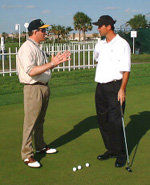
Using Feedback to Your Advantage in Golf
Have you ever been overwhelmed by advice after a round of golf from teammates, coaches, or playing partners?
The mind can only process a limited amount of information before you are overwhelmed and confused.
Have you ever played a round right after taking a lesson? Was your mind calm or filled with swing cues?
To illustrate how too much advice and feedback can affect a golfer, let’s examine the case of Garrett P…
Garrett is a Division II golfer and one of the best on his team.
Despite his success, his play is inconsistent.
Garrett often becomes overwhelmed by the amount of feedback he receives after each round of golf.
After each round of golf, Garrett’s coach will give him detailed feedback on his swing.
Before heading into the clubhouse, the assistant coach gives additional advice regarding his strategies for various holes.
Garrett normally solicits advice from some of his teammates also.
To add to matters, Garrett’s parents normally take him out to dinner and further review his performance during the round.
By the time Garrett arrives home, his mind has been overloaded with information and feedback that leaves him feeling negatively about himself and unsure how to correct his game.
Even though most advice is well-intended, how it is received and perceived can cause great difficulty for some golfers.
When it comes to excessive feedback, even professional golfers must be on alert.
LPGA golfer So Yeon Ryu finished her season at the 2018 CME Group Tour Championship tied for third.
Upon review of her season, So Yeon identified one problematic area as listening to too many outside sources which overloaded her mentally.
SO YEON RYU:“I had a good time and bad time this year, but I guess most of the time was good time. The biggest thing I learned this year was I really have to be myself. I cannot really think everybody — I mean, I cannot really take everybody’s opinion. I think that’s one of the biggest lesson I had.”
So what’s the resolution to the feedback dilemma?
First of all, the right feedback is good. Without feedback, you cannot improve your game.
It is feedback that gives you insight to your game that you may overlook.
The problem is over thinking conflicting or excessive feedback.
Taking too much in and attempting to work on too many aspects of your game splits your focus.
Improving one part of your game requires the majority of your focus, time and effort.
In order to advance your golf game, find one or two voices that your wholeheartedly trust and give your undivided attention to improve 1-2 aspects of your game at a time.
Using Feedback for Improvement
Your coach is probably your best source of information.
After a round of golf, ask your coach for what you did well and 1-2 areas you need to improve.
In addition, understand that you cannot prevent others from giving you feedback.
Be thankful that these people care enough about your game but stay focused on that source that you trust.
Stick with one philosophy about your golf swing and don’t think that more input is always better.
Related Golf Psychology Articles
- How to Regroup After a Bad Round of Golf
- Hovald’s Mindset for Winning Golf
- How Mickelson Uses Smart Practice Principles
- Subscribe to The Golf Psychology Podcast on iTunes
- Subscribe to The Golf Psychology Podcast on Spotify
Golf Mental Coaching Programs

All golf psychology programs include the Golfer’s Mental Aptitude Assessment (GMAP), a custom Mental Game Plan, weekly coaching sessions, unlimited email correspondence, and The Golfer’s Mental Edge 2.0 workbook program.
One-on-one mental coaching is the fastest and most effective method to improve your mental game, boost your performance, and make lasting changes!
We have unique mental coaching programs, customized for you. Please contact us with any questions your have about our programs. Provide your name, email, and role below:
Or Call us today at 888-742-7225 | Mental Game Success Stories